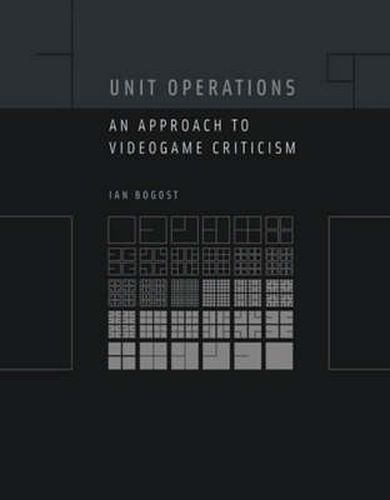Readings Newsletter
Become a Readings Member to make your shopping experience even easier.
Sign in or sign up for free!
You’re not far away from qualifying for FREE standard shipping within Australia
You’ve qualified for FREE standard shipping within Australia
The cart is loading…






This title provides a critical approach that marries literary theory and information technology, reading digital and cultural artifacts - whether videogames, literature, or film - as configurative systems of interlocking units of meaning.In Unit Operations , Ian Bogost argues that similar principles underlie both literary theory and computation, proposing a literary-technical theory that can be used to analyze particular videogames. Moreover, this approach can be applied beyond videogames: Bogost suggests that any medium - from videogames to poetry, literature, cinema, or art - can be read as a configurative system of discrete, interlocking units of meaning, and he illustrates this method of analysis with examples from all these fields. The marriage of literary theory and information technology, he argues, will help humanists take technology more seriously and help technologists better understand software and videogames as cultural artifacts. This approach is especially useful for the comparative analysis of digital and nondigital artifacts and allows scholars from other fields who are interested in studying videogames to avoid the esoteric isolation of game studies.
The richness of Bogost’s comparative approach can be seen in his discussions of works by such philosophers and theorists as Plato, Badiou, Zizek and McLuhan, and in his analysis of numerous videogames. His extended analysis of freedom in large virtual spaces examines Grand Theft Auto 3, The Legend of Zelda, Flaubert’s Madame Bovary, and Joyce’s Ulysses. In Unit Operations , Bogost not only offers a new methodology for videogame criticism but argues for the possibility of real collaboration between the humanities and information technology.
$9.00 standard shipping within Australia
FREE standard shipping within Australia for orders over $100.00
Express & International shipping calculated at checkout
Stock availability can be subject to change without notice. We recommend calling the shop or contacting our online team to check availability of low stock items. Please see our Shopping Online page for more details.
This title provides a critical approach that marries literary theory and information technology, reading digital and cultural artifacts - whether videogames, literature, or film - as configurative systems of interlocking units of meaning.In Unit Operations , Ian Bogost argues that similar principles underlie both literary theory and computation, proposing a literary-technical theory that can be used to analyze particular videogames. Moreover, this approach can be applied beyond videogames: Bogost suggests that any medium - from videogames to poetry, literature, cinema, or art - can be read as a configurative system of discrete, interlocking units of meaning, and he illustrates this method of analysis with examples from all these fields. The marriage of literary theory and information technology, he argues, will help humanists take technology more seriously and help technologists better understand software and videogames as cultural artifacts. This approach is especially useful for the comparative analysis of digital and nondigital artifacts and allows scholars from other fields who are interested in studying videogames to avoid the esoteric isolation of game studies.
The richness of Bogost’s comparative approach can be seen in his discussions of works by such philosophers and theorists as Plato, Badiou, Zizek and McLuhan, and in his analysis of numerous videogames. His extended analysis of freedom in large virtual spaces examines Grand Theft Auto 3, The Legend of Zelda, Flaubert’s Madame Bovary, and Joyce’s Ulysses. In Unit Operations , Bogost not only offers a new methodology for videogame criticism but argues for the possibility of real collaboration between the humanities and information technology.